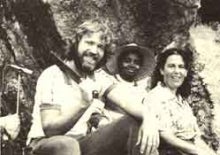Remembering Kojo: The Maroons of Accompong, Jamaica

By guest columnist Carol Merrill-Mirsky, Ph.D.
Jeff Richmond, Jacqueline DjeDje, and Carol Merrill-Mirsky at the "Peace Cave" where the 1738-39 Peace Treaty was signed. Photo courtesy Jeff Richmond.
In 1986, Professor Jacqueline Cogdell DjeDje and I made a short field trip to Jamaica to observe and record the January Sixth celebration of the Maroons of the village of Accompong, which commemorates both the birth of the Maroon leader, Kojo (Cudjoe), and his victory over the British, which resulted in the signing of the peace treaty of 1738-39. Jeff Richmond, as videographer, and our daughters, who were nine and ten years old at the time, accompanied us.
The Accompong Maroons are descendants of Africans taken to Jamaica in the seventeenth and eighteenth centuries who successfully resisted enslavement by the British rulers of the island. Accompong is the largest of several Maroon villages in the remote mountain area of Jamaica known as the Cockpit Country. In 1986, Accompong was a town of about 1,600 inhabitants. It is located in St. Elizabeth parish in the western part of Jamaica approximately thirty-five miles southeast of Montego Bay.
A chance meeting with a UCLA film student last year in 2014 caused me to rethink the value of our old VHS field video. I had edited it down from endless hours of footage during the summer of 1986 and never gave it much thought again, mostly because the quality of the video left a lot to be desired. Shooting on VHS was fairly new at the time, definition and color were poor, and editing was primitive. But this film student, whom I met at a hipster event in Echo Park, said that there was an interest today in old VHS tapes like the ones I was sharing that day of my dissertation research on hand-clapping games.
While I was a bit skeptical that old videotapes were interesting to anyone, I dug out the Maroon video along with the hand-clapping videos and another video I made in the late 1980s called “Rhythms & Roots: Five Musical Families,” when I first started work as curator at the Hollywood Bowl Museum. Recently I had been working on videos for the Bowl with Hoku Uchiyama at Vanishing Angle, a Los Angeles-based film production company. I was about to retire. I suddenly had time to do my own projects. I worked with Vanishing Angle to digitize and improve the old tapes as much as was possible; we re-edited, added subtitles, and created new titles to replace the funny-looking dot-matrix titles from the 1980s.
Jacqueline DjeDje and I met to talk about what we wanted to do with the new version of the Maroon video. Publish it? Sell it? Make it available on a fee-based academic website? We quickly decided that we wanted to make it available for free to anyone who was interested. When we visited Accompong in 1986, there was no electricity or running water. I’m pretty sure they have computers and smart phones there now. We are reaching out to contacts in Accompong who can view this video, see their friends and family members of thirty years ago, and share the documentation of a piece of their cultural history.
Farika Birhan, a friend of the Accompong Maroons, organized the 1986 trip. With funding and support from the UCLA Academic Senate, Center for African-American Studies, Institute of American Cultures, and Department of Ethnomusicology, the project was accomplished with the cooperation and assistance of all residents of Accompong.
In addition, an article by DjeDje, entitled “Remembering Kojo: History, Music, and Gender in the January Sixth Celebration of the Jamaican Accompong Maroons,” that documents the 1986 celebration can be found in the Black Music Research Journal, Volume 18, Number 1/2, Spring/Fall 1998.
The film is now online on the Ethnomusicology Archive channel on the Internet Archive.





